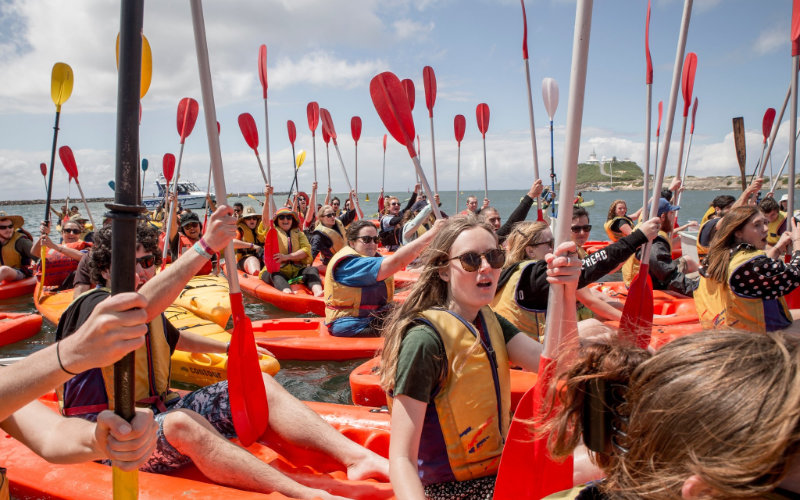Climate activist group Rising Tide has vowed to stage the largest civil disobedience action in Australia’s history by stopping coal ships leaving or entering Newcastle Port for 30 hours. Wendy Bacon reports.
This weekend, thousands of protesters are planning to block the world’s biggest coal port in Newcastle.
Rising Tide, a ‘climate defence’ movement that stopped a coal train in April, has vowed to stage the largest civil disobedience action in Australia’s history by stopping coal ships leaving or entering Newcastle Port for 30 hours.
The action will delay eight ships scheduled to carry half a million tons of coal and is part of Rising Tide’s campaign to end coal export from Newcastle. The coal exported through Newcastle port in 2022 was equal to 77% of all Australian domestic emissions.
Protesters from every state in Australia have registered to join Newcastle locals in a crowd of thousands at the blockade.
On Monday this week, the Anglican Dean of Newcastle Katherine Bowyer, a strong supporter of climate action, blessed watercraft and activists who will take part in the blockade in a ceremony at Christ Church Cathedral. “Whether you are a person of faith or not, this is about acknowledging we all have an overarching responsibility to care for the world and creation,” she said.
Bowyer is the latest in a series of high-profile figures including Senator David Pocock and the Lord Mayor of Sydney Clover Moore who have lent their support to the planned blockade.
Eraring on the side of dirty: Minns to subsidise Australia’s biggest old coal clunker?
Protest actions approved
Rising Tide’s vision is for a sea of blue banners and flags flying from scores of craft launched to block the passage for ships from a campsite at Horseshoe Bay, on the lands of the Worimi and Awabakal people. Organisers are not expecting arrests as it is legal to float in the harbour and smaller peaceful protest flotillas have been held before in Newcastle.
Nevertheless, organisers have been negotiating for approval for the protest. Approval finally came through on Tuesday morning for four days of camping and 30 hours of on-water blockading. Even the NSW Police Minister Yasmin Catley, who is also the local member for nearby Swansea, told NBN reporter Toni Ambrogetti this week,
I think it’s important that people have these discussions – we all know where things are headed.
As well as closing the port by 2030, the blockaders are demanding that the Federal Labor government cancel all new fossil fuel projects.
Importantly in a region that has traditionally depended on fossil fuel production and exports, they want the Federal government to introduce a 75% tax on the profits of existing exports to fund a ‘just transition’ towards a new sustainable economy, and to repair damage caused by global warming to community health, housing infrastructure and the environment.
Fossil fuel export damage
The emphasis on fossil fuel exports reflects a growing awareness that Australia, as the world’s third-largest exporter of fossil fuels, is a major contributor to global warming. Australia’s exports when burnt emit three times more than its domestic emissions.
Australia is the fifth-biggest producer of coal and the seventh-biggest producer of gas. Researchers at The Australia Institute (TAI) have found that “there can be no new coal mines if we are to avoid dangerous climate change.” According to the TAI coal tracker, four new coal projects already approved by the Minister for Environment Tanya Plibersek will add 147 million tonnes of carbon emissions to the environment.
If the 25 additional projects in the pipeline were to be approved, the total extra emissions from coal alone with add 12.8 billion tons of CO2 emissions.
Slag Heap of History — coal is definitely not a ‘critical mineral’, no matter what Big Mining says
Direct action of a different kind
It is no mean feat to persuade thousands of fellow citizens to spend a weekend blocking a coal port. Rising Tide has been working behind the scenes for months to build momentum. In August and September, there were webinars and speakers’ tours around Australia to recruit activists.
In October, there were direct action training events. At Sydney’s Rose Bay on a drizzly Saturday morning in October, a small group of kayakers gathered on Sydney Harbour for a ‘training session’. Their ages ranged from under five to several in their seventies.
Advised by a veteran of earlier anti-war protests on Sydney Harbour, they were practising to make sure that if they were tipped into the water, they could clamber back onto their kayaks.
The next morning, the action moved to a warehouse in inner Sydney. A few of the kayakers and some other recruits attended an ‘art and crafts’ workshop to learn how to make ‘professional looking’ banners and scores of other flags and signs that will fly over Horseshoe Bay.
This time the instructor was someone with many years of experience in using a ‘magnetic wall’ to create signs to convey striking messages that add spectacle to civil disobedience actions.
On the same day, two other kayakers, emergency doctor Dr Simon Leslie and engineer Tom Hunt, were on the second day of their 435 kilometre journey by boat from Port Kembla on the South Coast to Newcastle where they will join the blockade. They are grandfathers whose decision to promote the blockade with their Sail4Sanity tour is motivated by an understanding that if governments continue to open new fossil fuel projects, the devastating impacts of global warming will get much worse in the lifetime of today’s children.
Before departing, Leslie said that he saw the journey as a “metaphor for the journey we all need to take to a renewable future. There may be some minor hardships … and even some risks.” He vowed to manage the risks so that they could join the blockade to “show the Federal government that they do not have the social licence to wreck our planet”.
Their vessel is a catamaran-style boat driven by pedal power and a sail bearing the message, “No More Fossil Fuels”. The trip has certainly had its challenges. On November 5 en route to Port Hacking, Leslie, who has 35 years of experience as a sailor, later recounted on Facebook that two days of a southeasterly wind combined with a northeast swell made for one of “the most confused oceans I have ever seen.”
The vessel couldn’t drain fast enough so it was taking on water. It was a tricky journey with Hunt experiencing seasickness and hypothermia. The boat needed repairs en route. They were unable to turn towards the coast until they reached Botany Bay.
While the immediate challenges sound scary, the kayakers are spurred on by their concern about the much more dangerous changes in the seas below them. In a message, one of the kayakers, Dr Simon Leslie, told the writer that as a surfer with more than 50 years of experience, he is noticing that the ocean is abnormally warm and there are “too many blubbers and more algae.” His own anecdotal evidence is backed by scientific warnings.
Marine heatwave
Right now a marine heatwave is being experienced off the coast of South East Australia. On November 8, the Climate Council released its report Code Blue:
Oceans in Crisis reveals that the immense amount of climate-change-induced heat currently being absorbed by the world’s oceans is equivalent to boiling the Sydney Harbour every eight minutes.
A highly targeted survey of 30 leading ocean scientists across five continents found that all of them were ‘extremely’ or ‘very’ concerned about climate-driven changes to the world’s oceans. Overwhelmingly, these scientists agreed that ‘rapidly phasing out fossil fuels’ is the single most important action governments could take to address ocean warming.
I asked Rising Tide’s youth campaigner Alex Stuart if she is still hopeful in the face of the scientific evidence of climate change and its devastating impacts. She responded that she sees
hope’ as a strategy rather than an emotion.
She does experience feelings of hopelessness but less so when she is acting for change.
Knitting Nannas
Stuart’s sentiments are similar to those often expressed by members of Knitting Nannas, a network of older women and supporters who instead of retiring, continually protest to protect the environment.
Just last week, they supported a member who had been arrested defending a forest, were there to meet the Sale4Sanity duo at the Opera House, helped launch a campaign to stop coal projects in NSW and were in court to monitor a pollution prosecution of Whitehaven coal. Knitting Nannas will have a ‘hub’ at the blockade.
I was born shortly after the Second World War and grew up in Victoria where the coal developments in the Latrobe Valley were seen as a symbol of progress and an economic panacea.
Last week, on November 17, I turned 77. This happened to be the “first day when global temperature was more than 2°C above pre-industrial (1850-1900) levels, at 2.06°C. On November 18, it happened again. Two days do not mean that we have gone beyond the 2°C limit but it means that we are getting closer to a point of catastrophic collapse of ecosystems, including loss of 99% of the world’s reefs.
Scientists say there is still a short window to act. Every fraction of a degree matters. In that situation, we must act to stop the burning of fossil fuels rather than stand still. This is why my partner and I decided that on Friday morning, we will load up two kayaks and head to Newcastle to be part of the Blockade.
Wendy Bacon is an investigative journalist who was the Professor of Journalism at UTS. She worked for Fairfax, Channel Nine and SBS and has published in The Guardian, New Matilda, City Hub and Overland. She has a long history in promoting independent and alternative journalism.
She is a long-term supporter of a peaceful BDS and the Greens.

